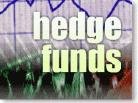|
Hedge funds win and lose
|
 |
September 16, 1998: 10:50 a.m. ET
The riskiest strategies lost billions, while conservative funds fared better
|
NEW YORK (CNNfn) - When the Russian ruble went south in currency markets in recent weeks, investing bigwig George Soros lost $2 billion, five hedge funds went bust and another fund lost a whopping 57.5 percent.
But 88 other hedge funds broke even or made a profit -- and one rocketed up 56.7 percent in August, according to Mar/Hedge, a newsletter based in New York that tracks 1,300 funds.
"You can't generalize about hedge funds," said Lois Peltz, managing editor of Mar/Hedge. "Some hedge funds did poorly, and some did well. It really depends on the investment strategy."
Hedge funds are for people with a lot of money to invest. The funds can "short" stock, which means they can gamble that prices will fall. They can buy distressed securities or use options, derivatives and other complicated instruments. They can also use ultra-risky leverage as an investing tool.
Many hedge funds have minimums of $100,000 or even $1 million, though there are some with minimums of as little as $10,000. There are about 4,000 funds with assets of roughly $400 billion, according to some industry estimates.
Hedge funds are structured so they don't have to limit their investments within the parameters for mutual funds outlined in the Investment Companies Act of 1940. For that reason, most hedge funds don't have reporting requirements, and many are headquartered offshore in exotic locales like the Cayman Islands. Many hedge fund managers are notoriously private.
The riskier the investment approach, the greater the potential returns -- and the greater the likelihood for staggering losses in bad times.
A little-understood investment
But many managers said they get frustrated that investors assume all hedge funds take the riskiest approaches. They argue that some hedge funds are more conservative than mutual funds.
"The problem is the word 'hedge fund' has been polluted," said Martin Armstrong, chairman of Princeton Economics International, a global investment firm with offices in Princeton, N.J. that runs three hedge funds. "We're plain vanilla. We're extremely conservative."
Armstrong's funds use long and short positions in major global markets, only investing in securities that are highly liquid and therefore safer. While the funds shorted Russian rubles, they stayed away from risky Brazilian and Russian bonds, he said. The funds only invest about 15 percent of the time, choosing to remain in cash until there's a good opportunity.
A fund like Soros's isn't a true hedge fund because there aren't both longs and shorts, Armstrong said. Rather, Soros is a global investor taking a bet on something, he said.
"We don't subscribe to the idea of buying Russian bonds to make 30 percent," Armstrong said. "That's been the lure. To some degree, these (big-losing) funds felt under pressure to produce high returns."
The advantage of a hedge fund is the ability to profit in an up or down market, said David Friedland, a principal of Magnum U.S. Investments Inc. in Miami. He and his brothers and sisters operate a family of domestic hedge funds.
Friedland's funds use a "fund of funds" strategy, which allows an investor to get exposure in many different funds without having to meet the exorbitant minimums.
"Hedge funds take an opportunity where the potential reward outweighs the risk," Friedland said. "They're trying to minimize their downside."
So while mutual funds had to watch their holdings in Asia plummet, for example, a hedge fund could capitalize on the situation.
"You're paying a hedge fund manager to be dynamic and opportunistic," said Jim Hedges, president of LJH Alternative Investment Advisors in Naples, Fla. "They invest across asset classes, and invest in a manner to take advantage of volatility. They have a bigger tool box and a bigger set of skills."
Hedges's firm oversees $2.5 billion in hedge fund assets. About 80 percent of the managers he invests with were down 2.5 percent to 5 percent, which is much less than the broader market suffered in August, he said.
"Compared with traditional equity markets, this is infinitely better," Hedges said.
Winners and losers
The biggest losers were funds that were highly leveraged, Peltz said. Five funds lost 99 percent in August and had to file for bankruptcy, she said. They are the High Risk Opportunities Fund LTD., High Risk Opportunities Fund LP, Russia Value Fund, McGinnis Partners Focus Fund and McGinnis global Fund.
Another big loser was Croesus-UFG Russia Fund, which dropped 57.5 percent.
"Global macro," funds, which invest in markets around the world, had mixed results, Peltz said. The winners in that category had less Russia exposure, she said.
Market neutral funds, in which managers try to "neutralize" risk, were also mixed, she said. Among the funds in this category that did well were: GAM Bond Fund, earning 21.6 percent, and JLH Capital, earning 10.1 percent.
Of the 88 funds that made money in August, 48 earned between 1 percent and 9.9 percent, according to Mar/Hedge.
But clearly the winners were short-sellers, who could take advantage of plummeting prices. Funds with this approach earned an average of 21.8 percent, Mar/Hedge said. At the top of the list was Peregrine Investment Partners, with a profit of 56.7 percent, followed by Skye Short-Selling Fund, with 24.3 percent. 
-- by staff writer Martine Costello
|
|
|
|
|
 |

|

